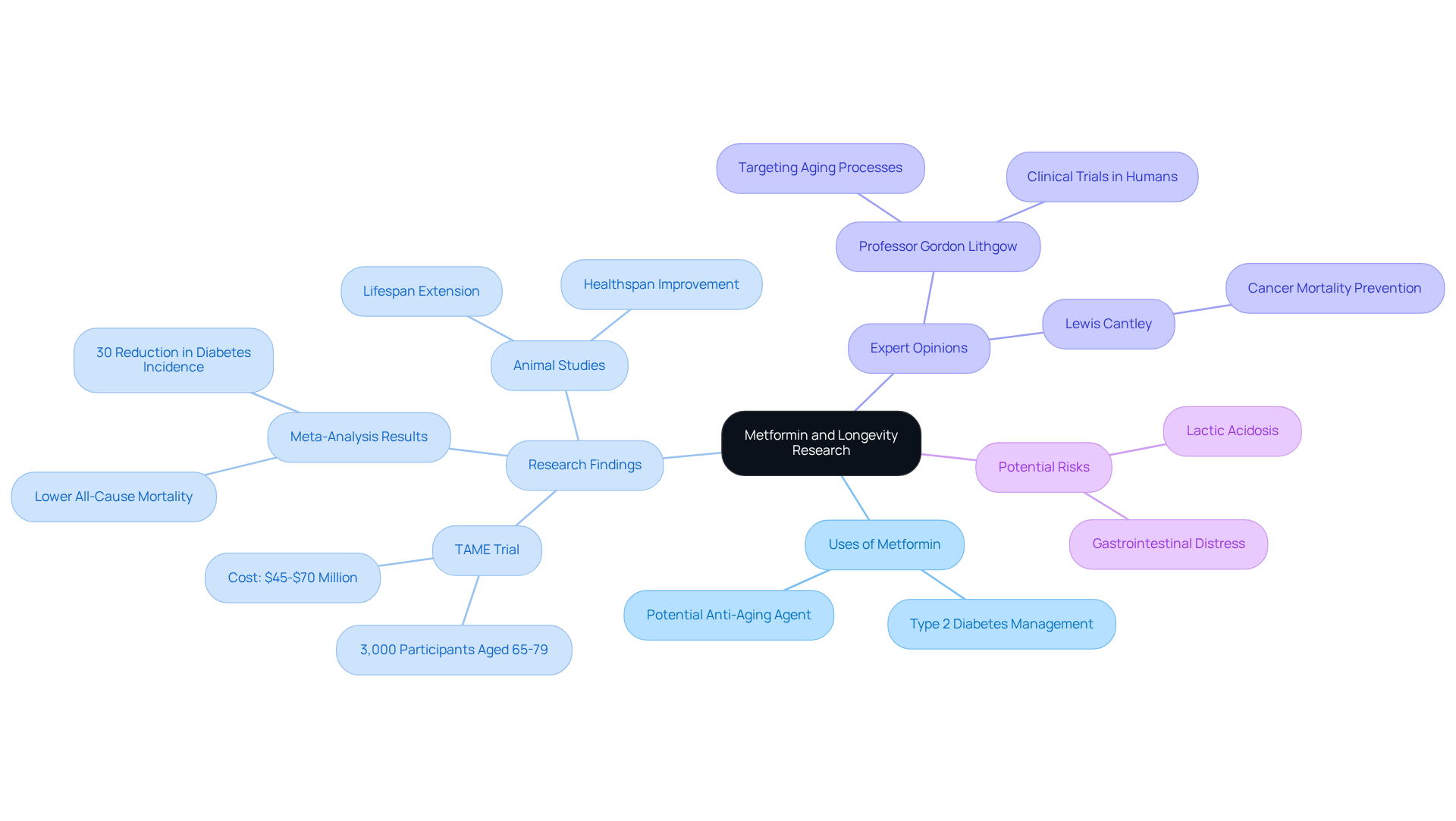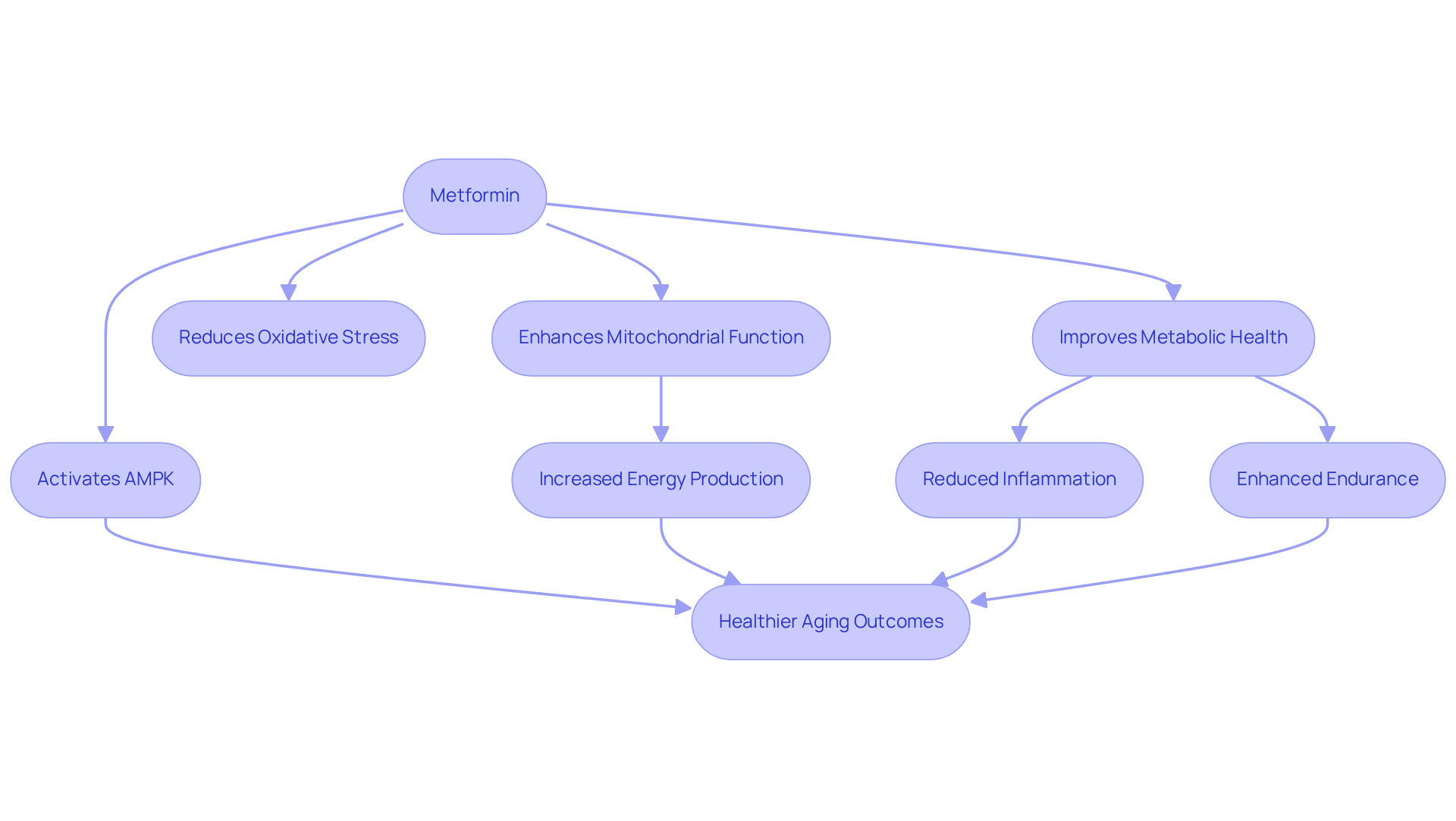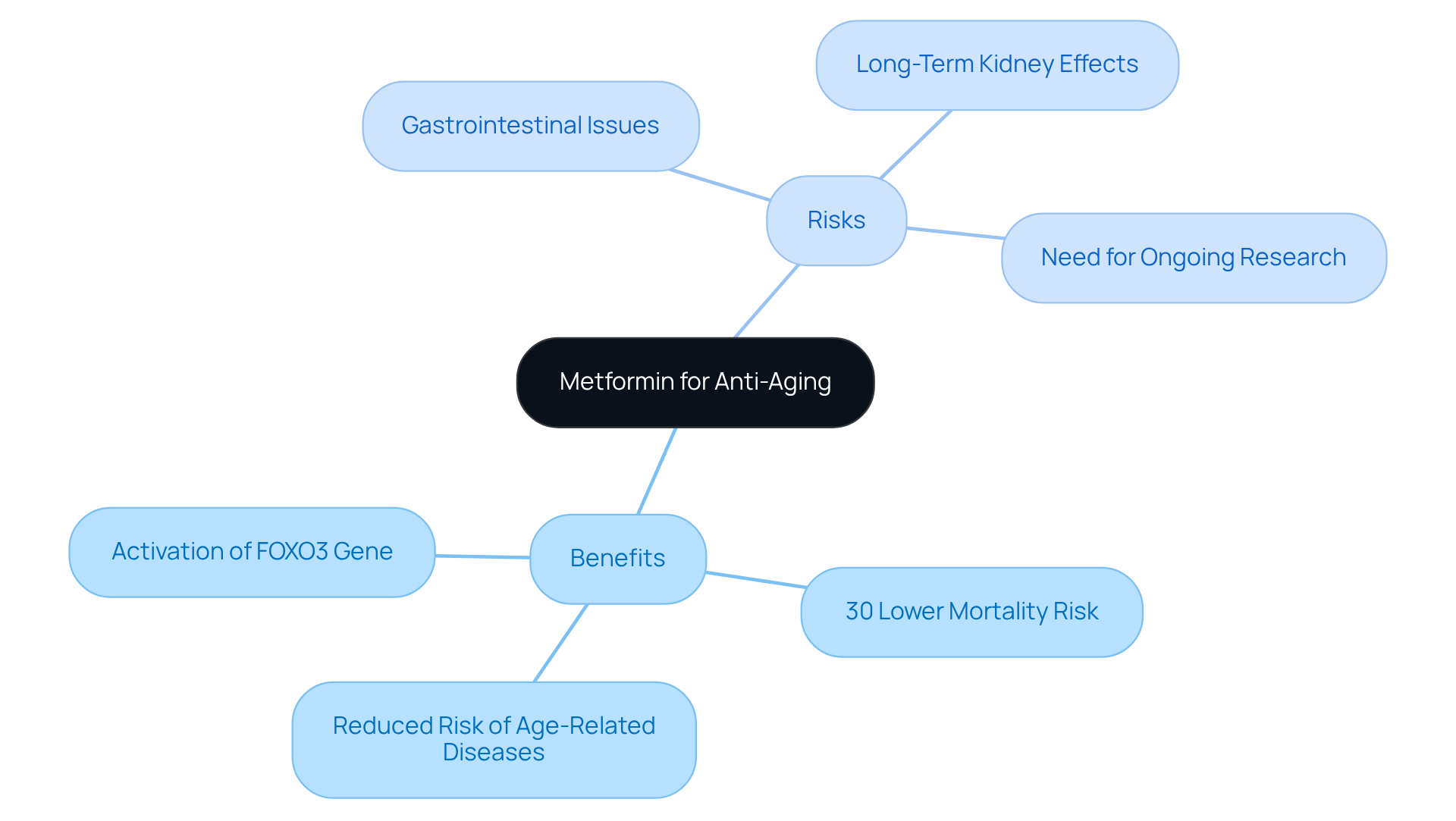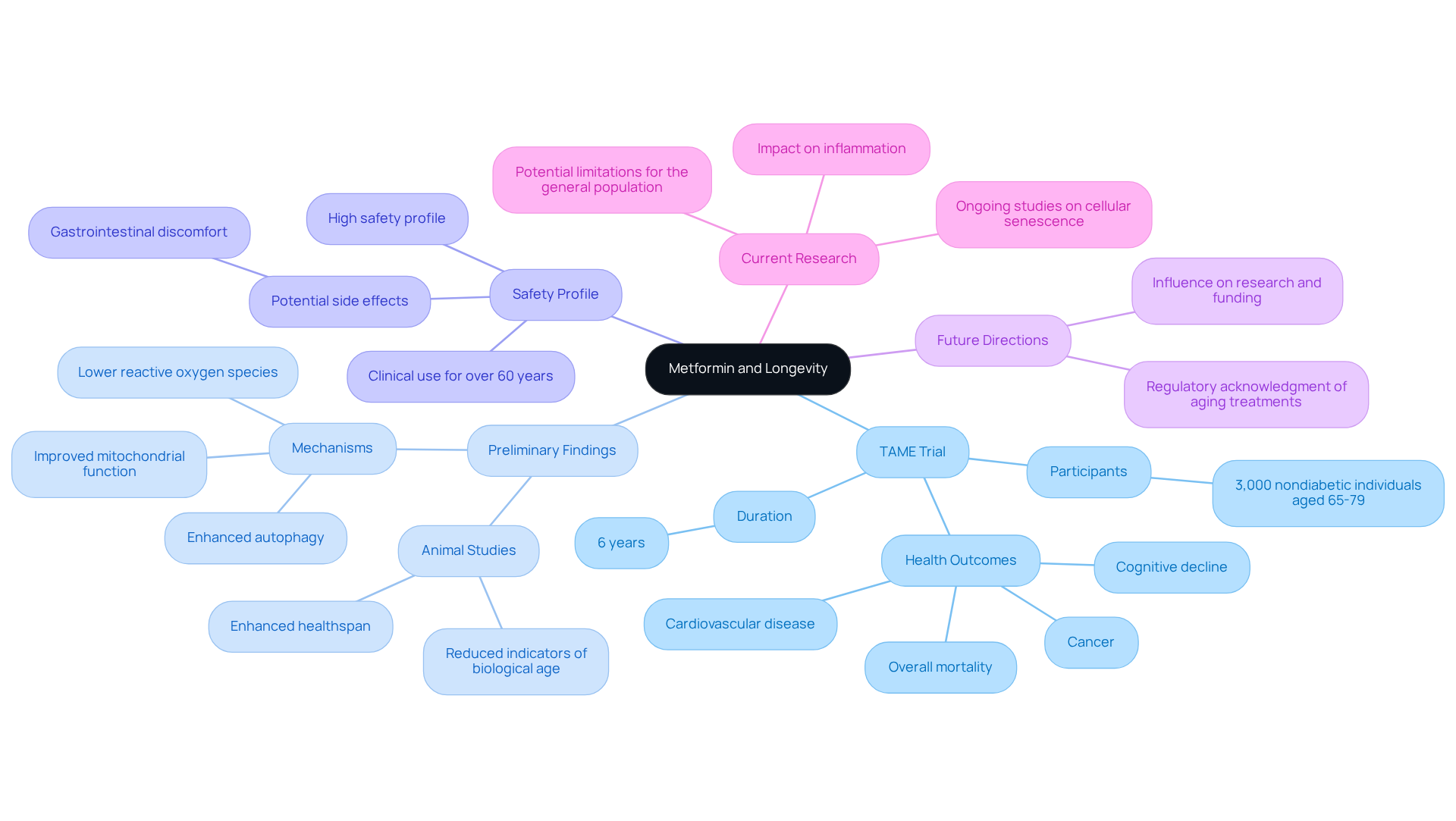Understanding Metformin and Longevity: Key Insights and Benefits
Overview
This article delves into the intriguing relationship between metformin, a widely used diabetes medication, and its potential benefits for longevity. It suggests that metformin may not only extend lifespan but also enhance healthspan by activating cellular repair mechanisms and reducing the incidence of age-related diseases. Various studies support this notion, indicating that metformin users experience lower mortality rates. Furthermore, ongoing research, such as the TAME trial, aims to provide definitive evidence of metformin’s efficacy in delaying the aging process.
As we explore this topic, it becomes clear that the implications of metformin extend beyond diabetes management. Could this medication be a key to healthier aging? With compelling evidence emerging, the scientific community is keen to understand how metformin might reshape our approach to longevity.
In conclusion, the potential of metformin in promoting longevity is an exciting area of research. For those interested in the intersection of medication and aging, staying informed about ongoing studies like the TAME trial could provide valuable insights into the future of health and longevity.
Introduction
Metformin, a medication traditionally used to manage type 2 diabetes, is emerging as a pivotal player in the quest for longevity. Recent studies suggest that its mechanisms may extend beyond blood sugar control, potentially influencing biological pathways associated with aging and healthspan.
As excitement builds around metformin’s anti-aging properties, questions arise:
- Can this common drug truly alter the aging process?
- Is it merely a promising hypothesis awaiting further validation?
This inquiry invites further exploration into the potential benefits of metformin, encouraging readers to consider its implications for health and longevity.
Defining Metformin: A Key Player in Longevity Research
Metformin is an oral medication primarily used to manage type 2 diabetes by improving insulin sensitivity and reducing glucose production in the liver. However, recent studies have positioned metformin as a possible anti-aging agent, sparking interest in its wider implications for longevity. Research indicates that metformin and longevity are interconnected, as it may affect several biological pathways linked to aging, making it a key topic in longevity studies. Its ability to mimic the effects of caloric restriction and activate cellular repair mechanisms has led scientists to investigate the relationship between metformin and longevity in extending lifespan and healthspan in humans.
Real-world examples highlight the anti-aging properties of this medication. A recent study involving over 78,000 participants revealed that those taking metformin demonstrated lower all-cause mortality rates compared to matched controls, indicating the potential for metformin and longevity benefits. Additionally, findings from the TAME trial, which aims to enroll 3,000 participants aged 65 to 79, seek to provide definitive evidence of metformin’s efficacy in delaying age-related chronic diseases. The estimated cost of the TAME trial is between $45 and $70 million, reflecting the scale of investment in this research.
Experts in the field, including Professor Gordon Lithgow, emphasize the revolutionary potential of targeting aging processes to mitigate age-related diseases. Furthermore, a systematic review has highlighted the mechanisms of metformin, such as AMPK activation, which may play a role in its geroprotective effects. Significantly, this medication has been linked to a 30% decrease in diabetes occurrence and has demonstrated potential in enhancing health outcomes in diverse groups, including seniors. Lewis Cantley, a notable investigator, observed that metformin and longevity studies indicate it may have prevented more individuals from cancer fatalities than any drug in history, underscoring its importance.
As research continues to unfold, metformin and longevity are increasingly highlighted not only for its established safety profile and affordability—costing about 50 cents a day or less with insurance—but also for its capacity to reshape our understanding of aging. However, it is important to note that most evidence regarding metformin’s benefits is observational, lacking definitive proof of cause and effect. Additionally, while this medication is generally safe, there are potential risks, including the rare chance of lactic acidosis. With continuous research and growing anecdotal support from health enthusiasts, the relationship between metformin and longevity is becoming a significant factor in the pursuit of healthier living.

Mechanisms of Action: How Metformin Affects Aging Processes
The interconnected mechanisms behind metformin and longevity contribute to its anti-aging properties. A primary action is the activation of AMP-activated protein kinase (AMPK), a vital regulator of cellular energy homeostasis. By stimulating AMPK, this medication enhances mitochondrial function, which is crucial for energy production and overall cellular health. This activation not only improves mitochondrial efficiency but also reduces oxidative stress, a significant contributor to cellular aging. Furthermore, AMPK activation has been linked to reduced inflammation and improved metabolic health, both essential for combating age-related diseases.
Research indicates that Metformin can reduce inflammation and enhance metabolic health, both crucial for fighting age-related illnesses. For instance, studies show that diabetic individuals receiving metformin and longevity benefits lived a median of 15% longer than comparable controls without diabetes, emphasizing its potential in prolonging lifespan. Additionally, the capacity of Metformin to enhance mitochondrial function has been associated with better endurance and metabolic health in older mice, indicating its potential as a treatment for promoting longevity. Collectively, these mechanisms position Metformin and longevity as promising factors in the pursuit of healthier aging.

Evaluating the Benefits and Risks of Metformin for Anti-Aging
The potential benefits of this medication for anti-aging are increasingly supported by research, suggesting it may significantly reduce the risk of age-related diseases, such as heart conditions and certain cancers. For instance, a study found that metformin and longevity are connected, as metformin users had a 30% lower risk of dying before age 90 compared to those taking other diabetes medications, underscoring its promising role. Moreover, the number of older adults is projected to double to 1.6 billion by 2050, highlighting the critical need for anti-aging research. Metformin and longevity are further enhanced by its activation of the FOXO3 gene, which plays a role in aging.
However, despite these advantages, the medication is not without its risks. Common side effects include gastrointestinal issues, such as diarrhea and bloating, and concerns exist regarding its long-term effects on kidney function. Additionally, while this medication is associated with a lower risk of mortality, it does not establish causation, necessitating ongoing research to clarify these relationships.
As a result, individuals contemplating the use of this medication for longevity should consult healthcare professionals to thoroughly weigh the benefits against the associated risks, particularly in relation to their overall health and lifestyle choices.

Current Research and Future Directions in Metformin and Longevity
Recent studies on metformin and longevity are rapidly advancing, with numerous investigations underway to explore its effects on aging in humans. A notable initiative, the Targeting Aging with Metformin (TAME) trial, aims to evaluate the impact of metformin and longevity on effectively postponing the emergence of age-related illnesses in older adults. The trial plans to enroll 3,000 nondiabetic participants aged 65-79 over six years, focusing on critical outcomes such as cardiovascular disease, cancer, cognitive decline, and overall mortality.
Preliminary findings from animal studies suggest that this medication may reduce indicators of biological age and enhance healthspan. Evidence indicates its ability to lower reactive oxygen species and advanced glycation end-products, thereby mitigating macromolecular damage. Additionally, this medication has shown promise in improving mitochondrial function and enhancing autophagy, both crucial for maintaining cellular health as we age.
Significantly, this medication has been clinically used for over 60 years and boasts a high safety profile, reinforcing its credibility as a treatment option. Furthermore, the Diabetes Prevention Program study found that metformin reduced overall diabetes incidence by 31% compared to placebo, highlighting its effectiveness in age-related health outcomes.
The findings from the TAME trial could significantly influence future research and funding in the field of metformin and longevity. It represents the first large-scale clinical trial aimed at addressing the process of aging itself rather than individual diseases. Researchers, including Dr. Nir Barzilai, emphasize that the primary outcome of the TAME trial is to explore the group of illnesses linked to aging. Dr. Barzilai states, ‘We’re targeting the process of getting older. We don’t care what disease you have and we don’t care which disease you’re going to get.’ This focus could pave the way for regulatory acknowledgment of the elderly as a target for therapeutic interventions.
As the field of investigation progresses, it is crucial to track the results of these studies to gain clearer insights into the long-term effects of this medication for older adults. Continuous exploration of metformin and longevity, including its impacts on cellular senescence and inflammation, emphasizes its promise as a transformative factor in achieving healthy longevity. However, it is also important to consider the potential limitations of metformin’s effectiveness for the general population, as ongoing research continues to clarify its role in aging.

Conclusion
Metformin has emerged as a significant player in the realm of longevity research, showcasing its potential not only as a diabetes management tool but also as a promising anti-aging agent. By influencing various biological pathways associated with aging, metformin offers a unique perspective on how medications can extend both lifespan and healthspan, positioning it as a focal point in the quest for healthier aging.
The article has highlighted several key insights into the relationship between metformin and longevity:
- Its ability to activate AMPK and enhance mitochondrial function.
- Its demonstrated effects on reducing age-related diseases and mortality rates.
The evidence supporting metformin’s role in promoting longevity is compelling. Furthermore, ongoing research, including the TAME trial, aims to provide definitive insights into its efficacy, while experts stress the importance of understanding both the benefits and potential risks associated with its use.
As research continues to uncover the complexities of aging, metformin stands out as a beacon of hope for those seeking to improve health outcomes in older adults. The implications of this research extend beyond individual health, potentially reshaping public health strategies and therapeutic approaches to aging. Engaging with healthcare professionals about the use of metformin for longevity could be a pivotal step towards harnessing its benefits while carefully considering the associated risks.
The exploration of metformin and its impact on longevity pathways is not just an academic pursuit; it represents a proactive approach to redefining aging and enhancing quality of life as we grow older.
Frequently Asked Questions
What is metformin primarily used for?
Metformin is primarily used to manage type 2 diabetes by improving insulin sensitivity and reducing glucose production in the liver.
How is metformin connected to longevity research?
Recent studies suggest that metformin may serve as an anti-aging agent, affecting biological pathways linked to aging and potentially extending lifespan and healthspan in humans.
What are some mechanisms through which metformin may promote longevity?
Metformin may mimic the effects of caloric restriction and activate cellular repair mechanisms, which are believed to contribute to its potential anti-aging properties.
What evidence supports the idea that metformin may have anti-aging benefits?
A study involving over 78,000 participants found that those taking metformin had lower all-cause mortality rates compared to matched controls, suggesting potential longevity benefits.
What is the TAME trial and what does it aim to achieve?
The TAME trial aims to enroll 3,000 participants aged 65 to 79 to provide definitive evidence of metformin’s efficacy in delaying age-related chronic diseases.
What is the estimated cost of the TAME trial?
The estimated cost of the TAME trial is between $45 and $70 million.
What have experts said about metformin’s potential in longevity research?
Experts like Professor Gordon Lithgow emphasize the revolutionary potential of targeting aging processes to mitigate age-related diseases.
What are some notable findings regarding metformin’s effects?
Metformin has been linked to a 30% decrease in diabetes occurrence and has shown potential in improving health outcomes in diverse groups, including seniors.
How does metformin compare to other drugs in terms of cancer prevention?
Lewis Cantley noted that metformin may have prevented more individuals from cancer fatalities than any drug in history, highlighting its significance.
What are the safety and cost considerations of metformin?
Metformin has an established safety profile and is affordable, costing about 50 cents a day or less with insurance.
Are there any risks associated with taking metformin?
While generally safe, there are potential risks, including a rare chance of lactic acidosis.
What is the current status of evidence regarding metformin’s benefits?
Most evidence regarding metformin’s benefits is observational, lacking definitive proof of cause and effect, but there is growing anecdotal support from health enthusiasts.






